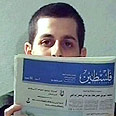
Report: French doctors examined Gilad Shalit
BBC network in Arabic, London-based al-Hayat newspaper say four physicians entered Gaza Strip last week together with German mediator, examined kidnapped Israeli soldier. Egyptian source: They went in to perform operations in Strip
A French medical crew, comprised of four doctors, entered the Gaza Strip last week and examined kidnapped Israeli soldier Gilad Shalit, several reliable media outlets reported Sunday. This was the first time a foreign element visited the captive.
Shalit's father, Noam, told Ynet he was unaware of any medical examination. "I don't think this even happened," he said.
An Egyptian security official confirmed to AFP that three French doctors went into the Gaza Strip through the Egyptian border crossing of Rafah last week, but that there was no indication that they were there to see Shalit.
"They went in to perform operations in Gaza. This is a very standard thing. Foreign medics provide medical services in the Gaza Strip on a regular basis," the official said.
According to the BBC network in Arabic and the London-based Arabic-language al-Hayat newspaper, the crew entered Gaza last Sunday with German mediator Ernst Uhrlau.
The doctors, the reports said, arrived in Cairo and travelled to Gaza through the Rafah crossing. The four physicians, who specialize in different fields, examined the captive in his abductors' hiding place.
The doctors and the mediator arrived in the Strip under unprecedented security measures on the part of Hamas, while Israel Air Force mini remotely-piloted vehicles were flying in the air, the reports said.
Hamas received a guarantee from Uhrlau that Israel would not attack and would not attempt to release Shalit.
A visit by a foreign elements may be another signal of progress in the prisoner exchange deal. Hamas has so far refused to allow such visits, and appeals by foreign organizations like the Red Cross have been turned down.
'Mediator threatened to quit'
Al-Hayat also reported that Uhrlau had threatened to quit his role as mediator due to Israel's insistence on its stance. Sources defined as reliable told the paper that he had made the threat in the latest round of talks due, feeling that Israel's persistence would cause the deal to fail.
The same sources defined the talks as "very complicated," saying that "the obstacles the deal is facing amount to Israel's refusal to release 44 prisoners who are east Jerusalem residents, 20 Israeli Arabs and one prisoner from the Golan Heights, who all began their prison terms before the Oslo Accords were signed, in addition to its insistence on deporting about 125 prisoners from the Gaza Strip abroad."
Last week, the State revealed in its response to a High Court petition that 980 prisoners would be released in exchange for Shalit.
"There is a possibility for the release in principle of about 450 prisoners whose names are being delivered by Hamas, and whose release is being examined in detail in accordance with different considerations and based on rationales of security and values," the State's representatives told the court.
As for the second stage of the deal, the State said that "as a gesture to the Palestinian people, some 530 additional prisoners selected by Israel as slated to be released. The list of these prisoners has not been formed yet and no criteria have been set on this matter."
AFP and Ahiya Raved contributed to this report










